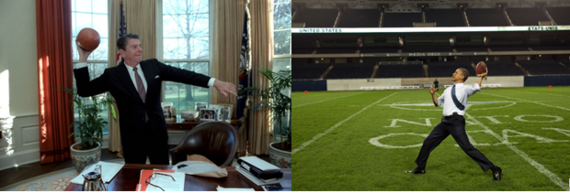According to the Fantasy Sports Trade Association, in 2014 there were 41.5 million fantasy sports players. Of that total, fantasy football has captured and captivated the hearts and wallets of 30 million fans across the globe to the tune of $3.6 billion dollars per season. To put it in perspective, these numbers are almost equivalent to the entire population of Canada and the GDP of Fiji.
Contrary to common misconceptions, fantasy is not just a game, but rather a platform that can help owners gain skills sets related to business and finance. However, unlike the aforementioned fields where multiple stakeholders can win, fantasy is more political in nature because only one person can win. As a result, perhaps politics truly is a contact sport after all.
The Lessons:
1. Pay Your Dues -- In Fantasy, everyone must pay a league fee in order to participate. In politics, you must also earn your way in by giving your time, money or both.
2. Get Top Cover -- In fantasy, if you want to be part of the league you must be friends with the commissioner. If you want to be involved in politics then you need to have a high ranking advocate or two.
3. Form Coalitions -- Sun Tzu once said, "Every battle is won before it is fought". Case in point, team owners often try to recruit friends to join their league because in the event of a ruling you need to have the quorum lobby on your behalf. In politics the same rule applies.
4. Make Fair Trades -- In fantasy, successful owners understand that it's mutually advantageous to help each other because a shared value approach bodes well for future transactions. Those who do not use this strategy are often perceived as greedy and rarely work deals with their counterparts. In politics, shared value is vital for bartering votes and personnel.
5. Avoid Scandals and Controversies -- In fantasy, it's wise to fully investigate a player's background in order to avoid potential season ending pitfalls. In politics, vetting is a top priority because you want to avert all skeletons in the closet.
6. Know the Rules -- It's often said that the devil is in the details and in fantasy the devil is in the league constitution. For example, how does your league value scoring and what are the deadlines? Yes, these may seem like trivial questions, but they are often the difference between winning and losing. In political campaigns, if you do not know the filing and finance rules/deadlines you can't run.
7. Sit on the Rules Committee -- In fantasy, the best informed people sit on the rules committee. If you do not have a seat, then know someone who does. In politics, knowing which new laws are implemented is essential.
8. If You Must Use a Loop Hole Make It Count -- In fantasy, whenever an owner uses a loop hole chances are the league will complain and the hole will soon be closed. Therefore, if you must use it, go big or go home. In politics, due to intricate legal language there will always be loop holes; consequently, proceed cautiously or else you may anger your party and constituents.
9. Never Get Complacent with Numbers -- In fantasy, every week computer algorithms predict which teams have the greatest percentage of winning. In politics, polls and fundraising totals yield the same result. Therefore, even though the numbers might be in your favor, always play as though you are behind, otherwise you may risk losing the campaign due to over confidence.
10. If You See Something Say Something -- In fantasy, if you see something unethical you say something to the committee and or the commissioner. This way the integrity of the league is not compromised. In politics, the first amendment is necessary to carry out the functions of the fourth estate.
11. Pay It Forward -- It's often said, "The enemy of my enemy is my friend". In fantasy, your enemy one week is an ally the next. Therefore, successful owners often help less fortunate owners since you never know when you will need help. Plus to be the best you have to beat the best. In politics, influential leaders create other leaders, because iron sharpens iron.
12. Build a Diverse Team -- In fantasy, sometimes you lose the best players. Therefore, in order to mitigate risk you should build a balanced and diverse team filled with potential sleepers and replacements. In politics, it is paramount to recruit people with disparate views and backgrounds in order to reach the full spectrum of your constituency.
13. Throw a Party (Fundraise) -- In fantasy, owners often throw a party at their house or financially sponsor a happy hour because it gives them access to other owners strategies, while building future good will. In politics, the candidate with the most money wins the election in 9 out of 10 races. Thus wise politicians fundraise for other politicians.
Yes, fantasy football is much more than a game; it's a political science crash course. Now if we could just get more people to play together, then fantasy sports may help us bridge the world's political and diplomatic divide.
